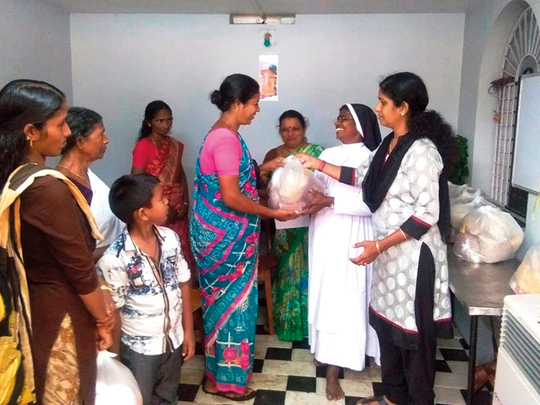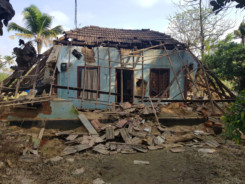
Abu Dhabi: When the going gets tough, the tough get going. This was proven by a group that I am a part of called the “Our Irinjalakuda”, a Facebook group based out of Irinjalakuda in Thrissur, India.
During the recent Kerala floods, the group with around 60,000 members and about 200 active volunteers formed a team and got to work. None of them were experienced or experts in disaster management. But, they lead, took orders, guided and acted forgetting their caste, creed, political party or ideologies.
The momentum they generated to coordinate this activity triggered and transformed to the group’s first relief support operation in the Alappuzha district, which was one of the heavily affected areas.
A small team left with a pickup truck, loaded with essential food and medicine supplies, to personally distribute to and support those in need. However, they didn’t know what was in store for them over the next few days.
All the dams and rivers started overflowing and the water level started increasing. As the paddy fields got flooded, the bridges and roads started collapsing and transportation became absolutely impossible.
Temporary disaster control centres were quickly formed. Members took different lead roles and were supported by local students. The effective use of WhatsApp and Facebook came to prominence at this point when electricity was cut and there was no radio or disaster management communication systems in place.
Jithesh Ambady, one of the members of the group, created a support group on WhatsApp, which became the lifeline of supplies for not only Thrissur district, but also to all the badly affected areas in Kerala.
He told Gulf News: “My mother and sister’s family are all witnesses and victims of this natural disaster. I was able to understand from them, the critical moments of seeing death passing right in front you. If I was able to do anything about it, it was all because of the good friendships I have. With the small time frame that we had, whatever we were able to do for the needy is the result of the priceless relationships we hold.”
He efficiently utilised the public transport buses. With the support from their staff, they transported essential medicines and food supply in the initial stages and later cleaning aids.
Dr Rose Anto, another member of the group, said: “The relief efforts taught us many things, but most importantly that humans should be interdependent and must keep an eye on social causes, always. If united we are strong.”
Those who were stuck outside of the town as well many non-resident Indians sprung into action, coordinating these activities by keeping vigil at night when those on ground took an hour or two for rest and regrouping.
The youth came up with several ideas and collaborated with the government authorities in the rebuild process. Teams were formed and spread out to each village and carried out cleaning operations and relief support.
Before the government system started their action, this relief group thought well ahead and sourced items for cleaning, disinfecting and also formed small teams to support restoration of water and electricity.
The team also started to clean the affected homes and scan them thoroughly for snakes or other reptiles. They worked in coordination with Snake Wild Animal Rescue Association (Swara).
All these activities were systematically done keeping the local authorities informed and taking them along to oversee, so that there is absolutely no fund or material mismanagement.
The disaster management outlined above is just one example. There are several other groups from all parts of Kerala that deserve merit. At the end of the day, everyone was united, stood together and worked their way around during those extremely difficult days. All are heroes and they proved that working together works.
As the government works on the rebuilding process, questions are in plenty from the general public on how we can cut costs and function efficiently. The government could introduce a mandatory and major cut on the allowances for ministers and support staff and reduce their numbers.
Apart from that, there are several commissions and bodies, which are consuming enormous funds from the government. Why not dissolve them once and for all and save costs?
There are also a large number of advisors for several ministers who are pampered with huge payment and government facilities. Why not reduce them and let the government come out with an open online portal for public to provide free and professional advice?
Each government minister and all higher authorities are luxuriously pampered with at least one or two police escort cars and personnel when they move around. Why don’t we implement a permanent stop to this?
All the above questions, if answered, could lead to quicker rebuilding of our beautiful Kerala.
— The reader is an Abu Dhabi resident.
Be a community reporter. Tell us what is happening in your community. Send us your videos and pictures at readers@gulfnews.com









